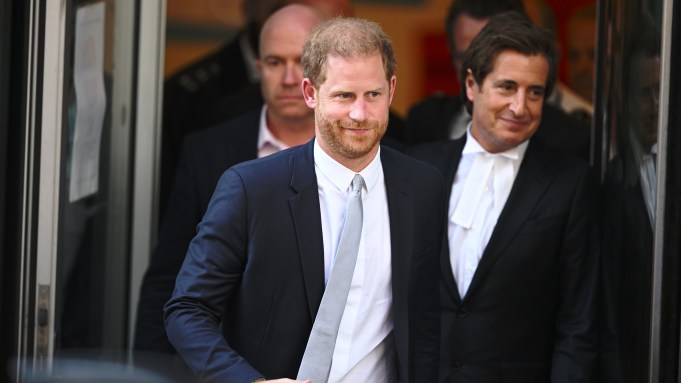Last week marked a significant moment for Prince Harry as he celebrated a substantial legal victory against media mogul Rupert Murdoch.
This wasn’t just any win; it came with a hefty settlement and an unexpected apology from Murdoch’s company, acknowledging the distress caused not only to Harry but also to his late mother, Princess Diana.
The admission of wrongdoing was a rare moment of accountability in the often murky waters of tabloid journalism.
However, despite this monumental development, the UK government has chosen to turn a blind eye.
They have firmly rejected calls for a new inquiry into press misconduct, even after the publisher of The Sun, News Group Newspapers (NGN), conceded that private investigators linked to them engaged in illegal activities between 1996 and 2011 concerning Harry’s life.
This acknowledgment raises serious questions about the integrity of the press and the government’s willingness to hold it accountable.
In a joint statement, Prince Harry and Lord Watson, who is also pursuing legal action against NGN, hailed the settlement as a landmark victory.
They urged for comprehensive investigations by police and Parliament into the admitted unlawful actions and potential cover-ups.
Yet, the Prime Minister’s office swiftly dismissed these appeals, maintaining its stance against reopening the Leveson Inquiry, which aimed to address press ethics.
Meanwhile, tensions flared on social media as actor Hugh Grant and journalist Piers Morgan exchanged barbs over the government’s refusal to revisit the Leveson Inquiry.
Grant, a vocal advocate for press reform, expressed sympathy for politicians who fear the influence of Murdoch, suggesting that many are intimidated by his power.
It’s hard to disagree; Murdoch’s grip on the media landscape is undeniably strong, and it seems to intimidate those in political positions.
Piers Morgan, never one to shy away from a fight, quickly retaliated, accusing Grant of hypocrisy for having previously accepted money from Murdoch for film projects.
Grant countered, asserting that he last worked with a Murdoch-owned entity in 1994, long before he understood the extent of Murdoch’s unethical practices.
This back-and-forth highlighted the ongoing divide between those seeking accountability and those defending the status quo.
Morgan’s attempts to discredit Grant fell flat, especially since the latter has been clear about his stance against Murdoch’s methods.
The conversation took a sharper turn when Morgan claimed that Grant’s film “Florence Foster Jenkins” was distributed by a Murdoch-owned company, only for Grant to clarify that his contract was with the BBC and Pathé.
This exchange showcased Morgan’s desperation to link Grant to Murdoch, despite Grant’s consistent rejection of Murdoch’s business offers since learning about his dubious practices.
Adding fuel to the fire, British actor and comedian John Cleese chimed in, drawing a stark contrast between a “well-educated mind” and what he described as a “lazy, sloppy tabloid one,” clearly pointing fingers at Morgan.
Cleese’s remarks emphasized the need for integrity and accountability in journalism, a sentiment echoed by both Grant and Cleese, who are involved with the campaign group Hacked Off, advocating for a responsible press.
Morgan’s history with Murdoch has always been contentious, and his recent defensive stance raises eyebrows.
After years of working for Murdoch’s outlets, his criticisms seem hypocritical, especially as he now tries to shield Murdoch from scrutiny.
Cleese’s commentary on Morgan’s financial ties to Murdoch only strengthens the argument that Morgan’s motivations are questionable.
In a biting retort, Cleese suggested that he needed time to research the difference between a “memory lapse” and “actual perjury,” alluding to Morgan’s past lies during the initial Leveson Inquiry.
This pointed jab serves as a reminder of Morgan’s controversial history and the trust issues surrounding his statements.
As the debate rages on, it’s evident that figures like Grant, Cleese, and even Prince Harry strive for justice and transparency in media practices.
In stark contrast, Morgan appears more concerned about deflecting attention from his own past than engaging in meaningful dialogue about press ethics.
Interestingly, the mounting pressure seems to have driven Morgan to seek refuge in Saudi Arabia, perhaps indicating that the heat of the discussion has become too intense for him.
His retreat raises questions about his commitment to the issues at hand and whether he can continue to defend the very system that many are trying to reform.
The ongoing battle between those advocating for accountability and those defending the status quo is far from over.
As public figures continue to call out the media’s unethical practices, it becomes increasingly important to support the movement for a fair and responsible press.
The fight for justice, led by Prince Harry and his allies, highlights the pressing need for reform in an industry often plagued by scandal and misconduct.
Related Stories

